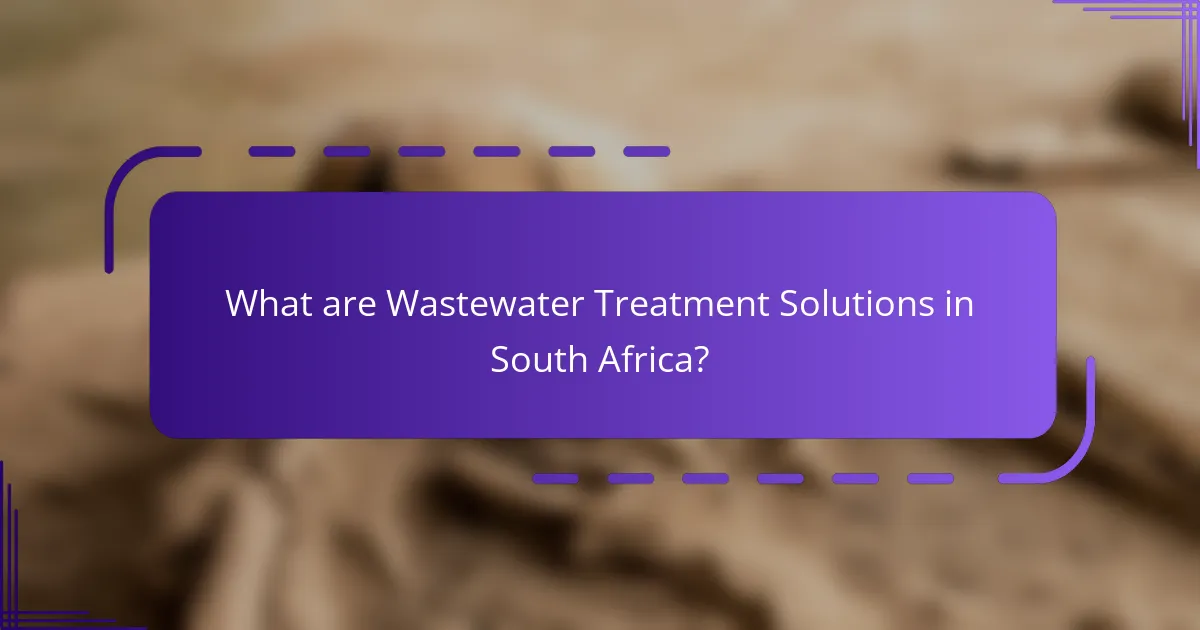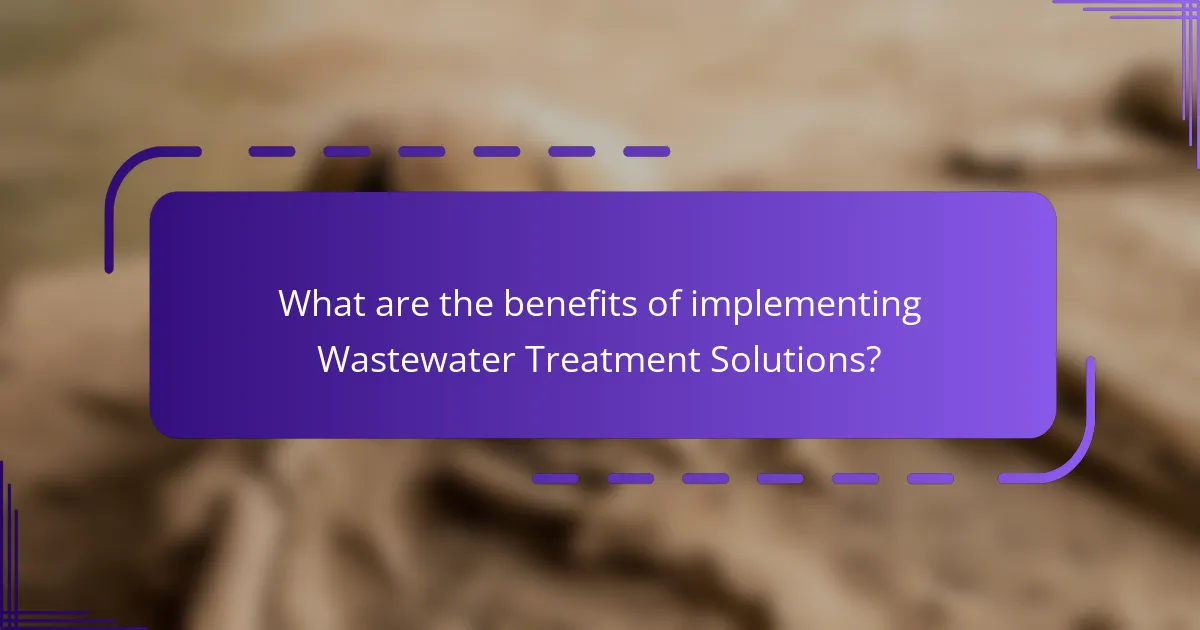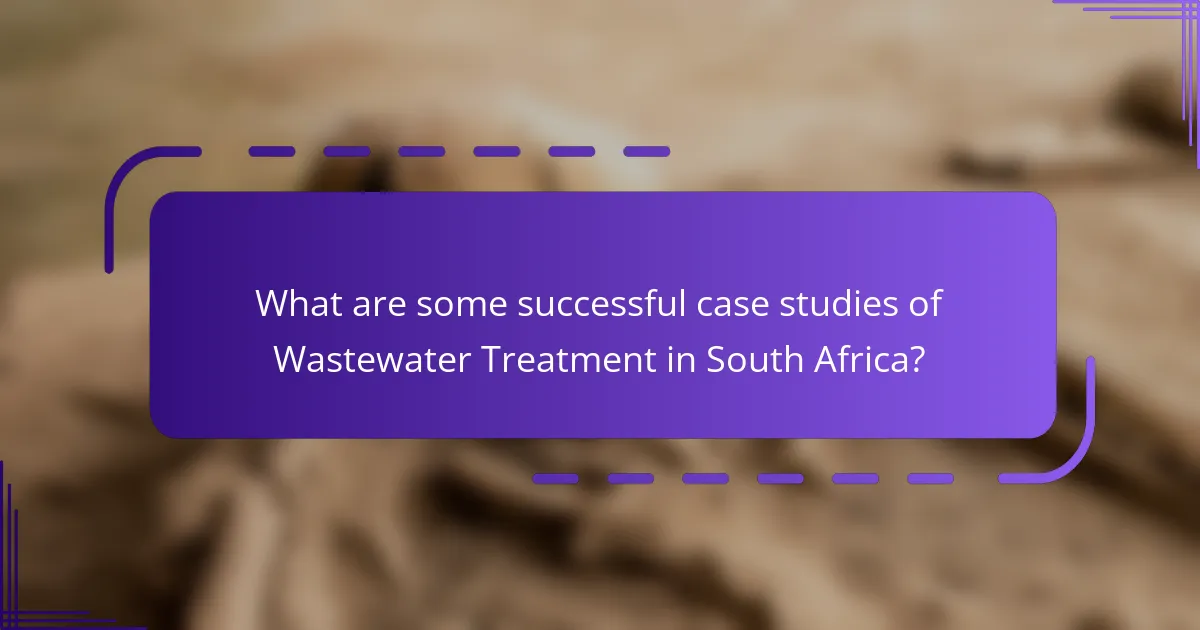Wastewater treatment solutions in South Africa encompass a range of methods designed to manage sewage and industrial wastewater, focusing on contaminant removal to produce clean water for reuse or safe discharge. Key techniques include biological treatment, such as activated sludge systems and biofilters; chemical treatment, involving coagulation and disinfection; and physical treatment methods like sedimentation and filtration. Effective wastewater management is essential for public health and environmental protection, particularly in the context of challenges such as aging infrastructure and water scarcity. Notable case studies, including the Cape Town Water Reclamation Plant and eThekwini Municipality’s facilities, highlight successful implementations that improve water quality and promote sustainable practices.

What are Wastewater Treatment Solutions in South Africa?
Wastewater treatment solutions in South Africa include various methods to treat and manage sewage and industrial wastewater. These solutions aim to remove contaminants and produce clean water for reuse or safe discharge. Common techniques include biological treatment, chemical treatment, and physical treatment processes. Biological treatment often involves activated sludge systems and biofilters. Chemical treatment may utilize coagulation and disinfection methods. Physical treatment includes sedimentation and filtration processes. According to the South African Water Quality Guidelines, effective wastewater treatment is crucial for protecting public health and the environment. The country faces challenges such as aging infrastructure and water scarcity, making these solutions essential.
How do Wastewater Treatment Solutions function?
Wastewater treatment solutions function by removing contaminants from sewage and industrial wastewater. These solutions typically involve a series of physical, biological, and chemical processes. First, physical processes like screening and sedimentation remove large solids and debris. Then, biological processes utilize microorganisms to break down organic matter.
Aerobic bacteria are often used in these biological stages to decompose waste effectively. Chemical processes may include the addition of chlorine or ozone to disinfect the treated water. After treatment, the water can be safely released into the environment or reused.
According to the South African Water Quality Guidelines, effective treatment can significantly reduce pollutants, ensuring compliance with environmental standards.
What are the key processes involved in wastewater treatment?
The key processes involved in wastewater treatment are preliminary treatment, primary treatment, secondary treatment, and tertiary treatment. Preliminary treatment removes large debris and grit from wastewater. This process typically includes screening and grit removal. Primary treatment allows solids to settle and separates liquid from sludge. This process usually involves sedimentation tanks. Secondary treatment involves biological processes to degrade organic matter. Common methods include activated sludge and trickling filters. Tertiary treatment further polishes the effluent. This stage often includes filtration and disinfection. Each process plays a crucial role in ensuring clean water is returned to the environment.
How do these processes differ across various treatment facilities?
Processes in wastewater treatment facilities differ based on technology and methods used. Some facilities employ activated sludge processes, while others utilize membrane bioreactors. The choice of treatment technology influences efficiency and effectiveness. For instance, membrane bioreactors can achieve higher removal rates of contaminants. Additionally, the scale of facilities affects operational practices. Larger facilities may implement advanced automation for monitoring. In contrast, smaller facilities might rely on manual systems. Geographic location also plays a role in treatment approaches. Areas with specific regulations may adopt unique processes to meet compliance. Variations in available resources can lead to differences in treatment capacity and methods. Overall, these factors contribute to the diverse landscape of wastewater treatment in South Africa.
Why are Wastewater Treatment Solutions important for South Africa?
Wastewater treatment solutions are crucial for South Africa due to water scarcity and pollution. The country faces significant challenges in managing its water resources. Approximately 80% of South Africa’s surface water is polluted, affecting health and ecosystems. Effective wastewater treatment reduces contaminants, ensuring safer water for communities. It also supports agricultural needs by providing treated water for irrigation. Moreover, these solutions help meet regulatory standards for water quality. Implementing advanced technologies can enhance efficiency and sustainability in water management. Overall, wastewater treatment is essential for public health, environmental protection, and economic development in South Africa.
What environmental impacts do untreated wastewater have?
Untreated wastewater has severe environmental impacts. It contaminates water bodies, leading to the degradation of aquatic ecosystems. Pollutants in untreated wastewater include pathogens, nutrients, and heavy metals. These substances harm fish and other wildlife. Nutrient overload causes eutrophication, resulting in oxygen depletion. Oxygen depletion leads to fish kills and loss of biodiversity. Untreated wastewater also poses risks to human health through contaminated drinking water sources. According to the World Health Organization, over 2 billion people lack access to safe drinking water, exacerbated by untreated wastewater.
How do these solutions contribute to public health and safety?
Wastewater treatment solutions contribute to public health and safety by reducing the risk of waterborne diseases. Effective treatment processes remove harmful pathogens from wastewater. This decreases the likelihood of outbreaks caused by contaminated water sources. For instance, proper treatment can eliminate bacteria and viruses that pose health risks. Additionally, treated wastewater can be safely reused for irrigation and industrial processes. This reduces the demand for freshwater resources. According to the World Health Organization, access to safe water can significantly lower disease incidence. Therefore, these solutions play a crucial role in maintaining community health and environmental safety.
What are the main types of Wastewater Treatment Techniques used in South Africa?
The main types of wastewater treatment techniques used in South Africa include biological treatment, chemical treatment, and physical treatment. Biological treatment involves the use of microorganisms to decompose organic matter. This method is commonly applied in activated sludge systems and biofilters. Chemical treatment utilizes chemicals to remove contaminants, often through processes like coagulation and flocculation. Physical treatment encompasses methods such as sedimentation and filtration to separate solids from liquids. These techniques are essential for managing wastewater effectively in urban and rural areas.
What is the role of biological treatment in wastewater management?
Biological treatment plays a crucial role in wastewater management by utilizing microorganisms to break down organic matter. This process significantly reduces pollutants in wastewater before it is released into the environment. Biological treatment methods include activated sludge processes and biofilm systems. These methods enhance the efficiency of wastewater treatment plants. They help in meeting environmental regulations and improving water quality. According to the South African Department of Water and Sanitation, biological treatment is essential for sustainable wastewater management. It contributes to the recycling of water and supports ecological balance.
How does physical treatment differ from chemical treatment methods?
Physical treatment methods involve the removal of contaminants from wastewater through physical processes. These processes include filtration, sedimentation, and flotation. In contrast, chemical treatment methods utilize chemical reactions to neutralize or remove pollutants. This can involve coagulation, flocculation, or disinfection using chemicals like chlorine.
The primary difference lies in their mechanisms. Physical treatments rely on the physical properties of materials, while chemical treatments depend on chemical interactions. For instance, sedimentation separates solids based on density, while coagulation involves adding chemicals to form larger particles for easier removal.
In South Africa, both methods are used in wastewater treatment facilities. Physical methods are often more cost-effective and simpler to operate. Chemical methods, however, can be more effective for specific contaminants. Understanding these differences helps in selecting appropriate treatment solutions for various wastewater challenges.

What are the benefits of implementing Wastewater Treatment Solutions?
Implementing wastewater treatment solutions improves environmental health by reducing pollution. These solutions prevent contaminants from entering water bodies. They also promote water recycling, conserving freshwater resources. Effective treatment systems can enhance public health by minimizing waterborne diseases. Additionally, they support sustainable agriculture through the safe reuse of treated water. According to the World Health Organization, proper wastewater management can reduce disease transmission by up to 50%. Implementing these solutions can also lead to economic benefits, such as job creation in the green technology sector.
How do these solutions support sustainable development?
Wastewater treatment solutions support sustainable development by conserving water resources and protecting ecosystems. These solutions reduce pollution levels in water bodies, promoting healthier aquatic environments. They also enable the reuse of treated water for irrigation and industrial processes, decreasing reliance on freshwater sources. In South Africa, effective wastewater management can enhance community resilience against water scarcity. According to the South African Department of Water and Sanitation, proper treatment can reduce health risks associated with contaminated water. Additionally, these solutions can create job opportunities in the green economy sector, fostering economic growth. Overall, they contribute to the United Nations Sustainable Development Goals, particularly Goal 6, which focuses on clean water and sanitation.
What economic advantages do effective wastewater treatment provide?
Effective wastewater treatment provides significant economic advantages. It reduces costs associated with environmental damage and public health issues. By treating wastewater, communities can avoid expenses related to pollution control and health care. Moreover, effective treatment can lead to the recovery of valuable resources, such as nutrients and energy. This resource recovery can create new economic opportunities within the local economy. Additionally, improved water quality can enhance property values and attract businesses. According to a study by the Water Environment Federation, every dollar invested in wastewater treatment returns approximately four dollars in economic benefits.
How do these solutions enhance water reuse and recycling efforts?
These solutions enhance water reuse and recycling efforts by improving the efficiency of wastewater treatment processes. Advanced technologies, such as membrane bioreactors, effectively remove contaminants. This leads to higher quality treated water suitable for various uses. Additionally, these methods reduce the volume of wastewater that requires disposal. By optimizing resource recovery, they promote sustainable water management practices. Studies show that effective treatment can recover up to 90% of water for reuse. This significantly contributes to water conservation in water-scarce regions like South Africa.
What challenges do Wastewater Treatment Solutions face in South Africa?
Wastewater treatment solutions in South Africa face significant challenges. Limited infrastructure hampers effective treatment processes. Aging facilities often lead to inefficiencies and higher operational costs. Water scarcity issues complicate the management of wastewater. Regulatory compliance remains a constant struggle for many operators. Financial constraints limit investments in modern technologies. Additionally, public awareness about wastewater management is often low. These factors collectively hinder the advancement of wastewater treatment solutions in the region.
How do infrastructure limitations affect wastewater treatment efficacy?
Infrastructure limitations significantly reduce the efficacy of wastewater treatment. Insufficient capacity in treatment plants leads to overflow during peak usage. This overflow can result in untreated or partially treated wastewater being released into the environment. Aging infrastructure often lacks modern technology for optimal treatment processes. Consequently, contaminants may remain in the water, posing health risks. Poorly maintained pipelines can cause leaks and infiltration, further complicating treatment efforts. In South Africa, the Water Research Commission reported that infrastructure challenges hinder compliance with water quality standards. Upgrading and maintaining infrastructure is essential for effective wastewater treatment.
What role does government policy play in supporting these solutions?
Government policy plays a crucial role in supporting wastewater treatment solutions in South Africa. It establishes regulatory frameworks that ensure compliance with environmental standards. Policies incentivize investment in innovative treatment technologies. The government often provides funding and grants to municipalities for infrastructure development. For example, the National Water Act mandates sustainable water management practices. This act encourages the adoption of efficient wastewater treatment methods. Furthermore, government initiatives promote public-private partnerships to enhance resource allocation. Overall, effective policies drive improvements in wastewater management and environmental protection.

What are some successful case studies of Wastewater Treatment in South Africa?
One successful case study of wastewater treatment in South Africa is the Cape Town Water Reclamation Plant. This facility treats wastewater to produce potable water. It has a capacity of 10 million liters per day. The plant uses advanced membrane technology for purification. This initiative has significantly reduced the city’s reliance on freshwater sources.
Another example is the eThekwini Municipality’s wastewater treatment works in Durban. This facility treats over 400 million liters of wastewater daily. It employs biological nutrient removal processes. This case has improved water quality in local rivers. It also supports the municipality’s environmental sustainability goals.
The Johannesburg Water’s Wastewater Treatment Works is also noteworthy. It treats approximately 600 million liters of wastewater daily. The facility focuses on energy efficiency and resource recovery. It has implemented biogas generation from sludge. This initiative has helped reduce operational costs and carbon emissions.
What lessons can be learned from successful wastewater treatment projects?
Successful wastewater treatment projects demonstrate the importance of community involvement. Engaging local stakeholders ensures that the projects meet community needs. Effective communication fosters trust and collaboration among all parties. Technological innovation plays a crucial role in enhancing treatment efficiency. Implementing advanced filtration and biological processes can significantly improve water quality. Sustainable practices, such as recycling treated water, are essential for resource conservation. Financial planning and securing funding are vital for project longevity. Projects often succeed when there is a clear regulatory framework guiding operations. Regular monitoring and maintenance are necessary to sustain treatment effectiveness over time.
How did community engagement contribute to project success?
Community engagement significantly contributed to project success in wastewater treatment solutions in South Africa. Engaging local communities fostered trust and collaboration. This involvement ensured that projects aligned with community needs and expectations. Feedback from residents led to tailored solutions that improved effectiveness. Active participation increased awareness about the importance of wastewater management. Community members became advocates for sustainable practices, enhancing project longevity. Studies show that projects with strong community ties have higher success rates. For example, the implementation of the Umgeni Water project saw a 40% increase in community participation, leading to improved outcomes.
What innovative technologies were utilized in these case studies?
Innovative technologies utilized in wastewater treatment case studies in South Africa include membrane bioreactors (MBRs), advanced oxidation processes (AOPs), and constructed wetlands. MBRs combine biological treatment and membrane filtration, enhancing effluent quality. AOPs use powerful oxidants to break down contaminants, improving treatment efficiency. Constructed wetlands mimic natural processes, providing a sustainable and eco-friendly solution. These technologies have been proven effective in various case studies across the region, demonstrating significant improvements in water quality and resource recovery.
What best practices can be adopted for effective wastewater treatment?
Implementing best practices for effective wastewater treatment involves several key strategies. Regular monitoring of wastewater quality ensures compliance with regulations. Utilizing advanced treatment technologies enhances efficiency and effectiveness. Proper maintenance of treatment facilities prevents breakdowns and optimizes performance. Training staff in operational protocols improves overall system management. Engaging in community awareness programs fosters public support and understanding. Adopting sustainable practices, such as resource recovery, minimizes environmental impact. These practices contribute to the overall success of wastewater treatment systems.
How can local communities participate in wastewater management initiatives?
Local communities can participate in wastewater management initiatives through various methods. They can engage in awareness programs that educate residents about the importance of proper wastewater disposal. Community members can volunteer for clean-up drives aimed at local water bodies affected by wastewater.
Additionally, residents can form committees to monitor local wastewater treatment facilities. They can also provide feedback to local government on wastewater management practices. Participation in workshops can help communities learn about sustainable practices.
In South Africa, community involvement has been shown to improve the efficiency of wastewater systems. Studies indicate that engaged communities lead to better compliance with regulations and improved water quality.
What are the key considerations for selecting a wastewater treatment method?
Key considerations for selecting a wastewater treatment method include the specific contaminants present, the required treatment level, and regulatory compliance. The treatment method must effectively address pollutants like nutrients, pathogens, and heavy metals. Cost-effectiveness is essential, encompassing both capital and operational expenses. The method’s environmental impact should be assessed, including energy consumption and byproduct management. Space availability for the treatment facility can influence method choice. Additionally, the method’s scalability and adaptability to future regulations are important. Proven effectiveness in similar contexts, such as the South African environment, can guide selection.
Wastewater treatment solutions in South Africa encompass various methods for treating and managing sewage and industrial wastewater to ensure the removal of contaminants and the production of clean water. Key techniques include biological, chemical, and physical treatment processes, each playing a vital role in safeguarding public health and the environment amidst challenges like aging infrastructure and water scarcity. The article explores the functioning of these treatment methods, their significance for sustainable development, and the economic advantages they provide, alongside successful case studies demonstrating innovative technologies and community engagement in wastewater management.